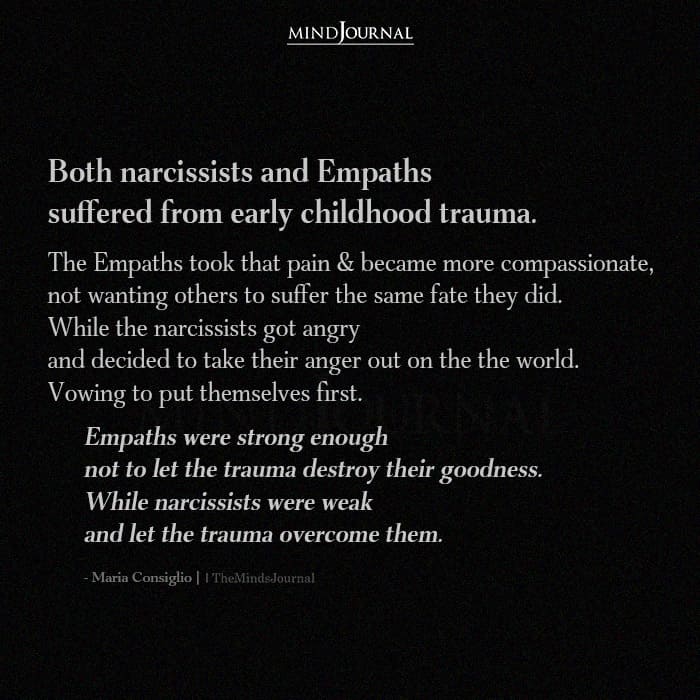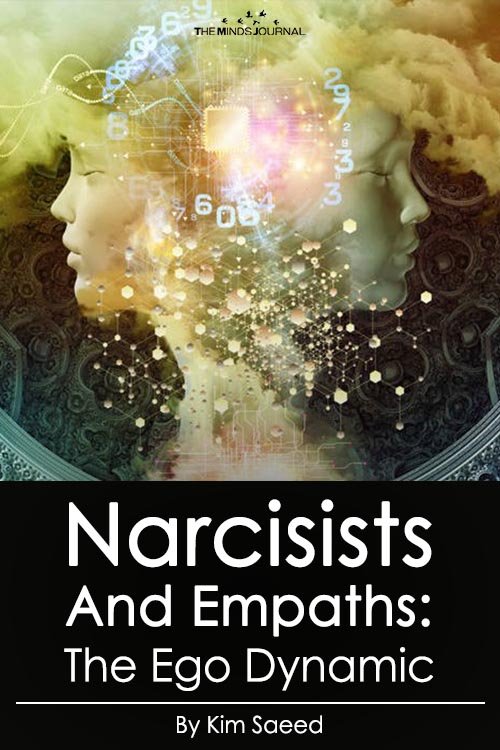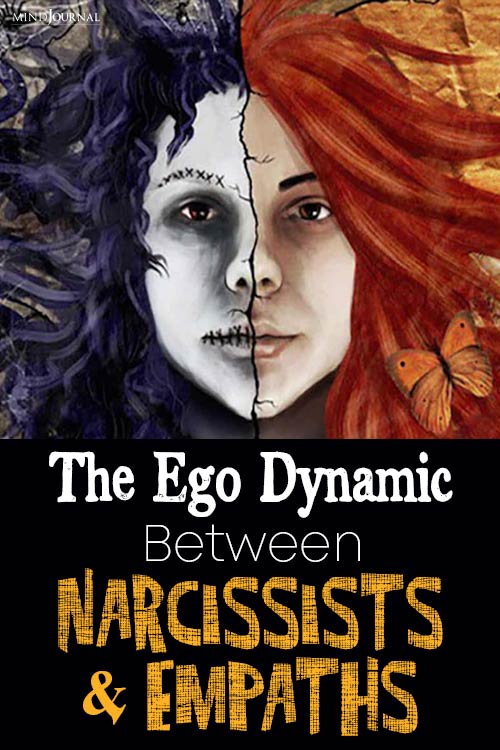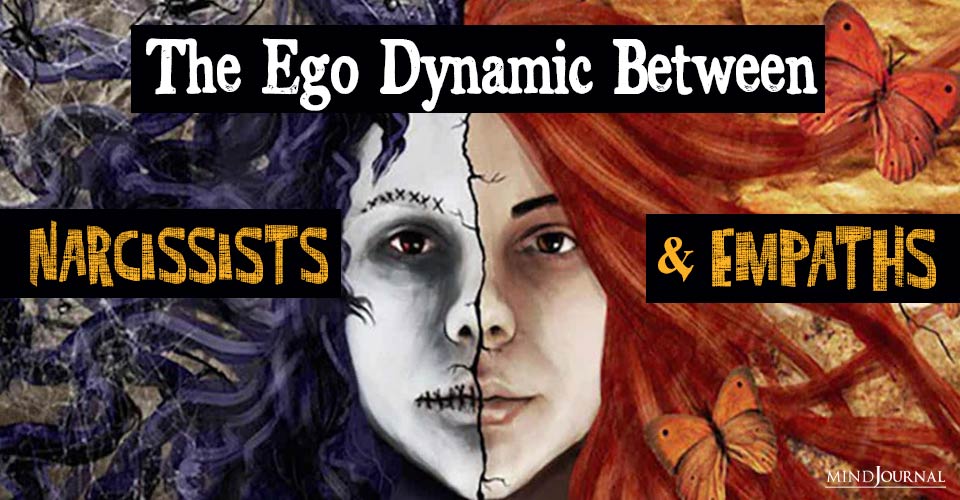The ego dynamic between narcissists and empaths is something that you should know if are in a relationship with a narcissist or have ever been in a relationship with a narcissist. There’s a difference between the ego of a narcissist and that of an empath. Let’s find out more about it, shall we?
There’s a lot of buzz in the media these days about Narcissists and Empaths/Highly Sensitives attracting to one another. One popular theory is that Narcissists prey on Empaths and Sensitives because of their overly giving nature.
While that is primarily true, there is another reason that goes even deeper, and it has to do with ego.
Related: Narcissist And Empath Attraction: What Is The Toxic Relationship Between An Empath And Narcissist?
Narcissists
First, let’s consider the definition of egotistical as it relates to Narcissists in general:
adjective
- Excessively conceited or absorbed in oneself; self-centered.
- Arrogance, selfishness, greed, a sense of entitlement to whatever one wants.
Too much ego can lead to serious problems with treating people as means to ends: such people (i.e., Narcissists) feel entitled to do whatever it takes to get what he/she wants. This leads to abuses of ends/means reasoning (using other people to fulfill the ego’s wants).
It’s no surprise that the criteria for Narcissistic Personality Disorder (DSM-IV) state that people with the disorder:
- have a grandiose sense of self-importance.
- have a sense of entitlement, i.e., unreasonable expectations of especially favorable treatment or automatic compliance with his or her expectations.
- are interpersonally exploitative, i.e., taking advantage of others to achieve his or her own ends.
Empaths
Empaths do possess an ego to some degree but don’t operate solely from ego as Narcissists do. For an Empath, the ego is experienced primarily in judging others and feelings of anger/resentment. These ego-driven emotions are usually incited in the Empath/HSP after witnessing acts of cruelty and hatred, interactions that they consider unfair or one-sided, and similar incidents.
Empaths operate predominately from love, humility, and giving. They have a natural capacity for healing and teaching others. However, until they learn how to responsibly use those gifts, they are often taken advantage of…not only by romantic partners but by people in general.
Many Empaths don’t realize what they are and go through life feeling used and unfulfilled. The Empath persona encompasses several personality types and traits and can include:
- INFJ
- ENFJ
- Melancholic
- Introvert
- Intuitive
(**These are the main types, and listed simply as a matter of reference)
Related: The Empath And The Wounded Narcissist: Toxic Dynamics Explained
The Magnetic Attraction
Empath’s sole purpose is to facilitate healing in others. Unfortunately, they usually ignore their own needs in doing so. They have the propensity to feel what’s going on outside of them more so than what’s inside.
In general, an empath is non-violent, non-aggressive, and leans more towards being the peacemaker. Any area filled with disharmony creates distress in an Empath. If they find themselves in the middle of a conflict, they will strive to resolve the situation as quickly as possible, if not avoid it altogether.
Because of these natural tendencies, the unaware Empath often finds themselves staying in a relationship with a toxic personality for too long.
Further, Empaths often have a track record of developing codependent behaviors in childhood to deal with the overwhelm of unfairness in the world and to please others, which they usually carry into their adult relationships…until a soul crisis happens where they are forced into awakening.

Empaths operate from their authentic self, even if they aren’t aware they are an Empath. Essentially, they associate with the life force, healing, and the urge to create what was not there before, such as when they try to “fix” people or situations, or help others heal and awaken.
Narcissists, on the other hand, don’t have an authentic self. If they had one as a child, it was stifled by ego as a defense mechanism. Their ego demands attention to its hurts, traumas, and concerns in a way that insists upon separation and control.
This prevents their ability to bond with other people and explains why their whole concept of reality consists of fulfilling the demands of their ego. Therefore, they use people without concern for the pain and trauma they cause them.
When the Narcissists and Empaths enter into a relationship together, it creates a magnetic, yet vibrationally dysfunctional union because the Empath gives to the point of complete and utter exhaustion. They will give every last effort to “fix” the Narcissist and the relationship, but it never happens.
The Narcissist cannot assess another’s perspective because their ego won’t allow that, thus there is no motive for the Narcissist to change. In fact, attempts to “help” the Narcissist and draw attention to their dysfunctional behaviors often make the Narcissist worse because it contradicts the cravings of their ego.
Related: The Science Behind The Toxic Relationship Between An Empath And A Narcissist
It also profoundly disorients the Empath, who is often destroyed by the relationship. However, it’s at this point that the unaware Empath experiences a soul crisis and comes to realize what they are.
Though the experience with the Narcissist is painful and overwhelming, the Empath usually learns their soul lessons and undergoes an awakening, whereas the Narcissist remains the same.
Want to know more about the ego dynamics between narcissists and empaths? Check this video out below!
Resources:
Broederlow, C. (2013, October 24). 30 traits of an Empath (How to know if you’re an Empath). Retrieved April 1, 2014, fromhttp://themindunleashed.org/2013/10/30-traits-of-empath.html Happe, M. (2011, August 12). The Relationship between Narcissism and Codependency. Retrieved April 3, 2014, fromhttps://www.mentalhelp.net/blogs/the-relationship-between-narcissism-and-codependency/ Lemieux, M. (2013, November 1). Spiritual Warrior Journals (Blog): 50 Traits of being an Empath (Vulnerabilities) – Part II:. Retrieved April 7, 2014, from http://myspiritualjournals.blogspot.com/2013/11/50-traits-of-being-empath-part-II.html Are You a Magnet for Narcissists? (2013, July 20). Retrieved April 10, 2014, from https://anupturnedsoul.wordpress.com/2013/07/20/are-you-a-magnet-for-narcissists/
Written by Kim Saeed This article was originally published on her website Let Me Reach Follow her website, for some more helpful reads.













Leave a Reply